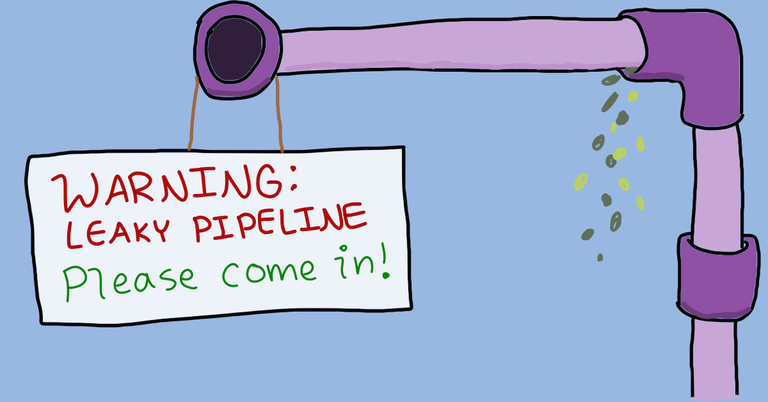What do you do when the path to your goal is riddled with traps that unfairly single you out?

A cartoon of the leaky pipeline. The leaks represent ways for people to fall out along the way. Original cartoon.
To an outside observer, it seemed obvious that I would teach math someday. In my fourth year of college – when I began pursuing a math teaching license – I couldn't shut up about math education. I had five years of tutoring experience and avidly read the works of current math-ed iconoclasts such as Paul Lockhart and Ben Orlin.
However, one marker of my identity – ADHD – had led me to question whether I could 1) do the job and 2) jump through all the necessary hoops to get the job.
Looking back, I realize that my experience followed a common formula: a young person wants to do something amazing, but feels pressure to quit because of some stigmatized identity marker – in my case, ADHD. Let's call this the "leaky pipeline" phenomenon – as you go through the "pipeline" to your destination, you encounter more reasons to quit (or "leaks") if the system isn't designed for you.
This piece is about my journey to becoming a teacher with ADHD. More than that, though, it's about a particular attitude towards unfairness. The problems I encountered confirmed that the pipeline to teaching is leaky for people like me. When it became clear that the odds were stacked against me, I had two choices:
give up on teaching; or
laugh at the odds and find a way through.
What I realized, though, was that the problems faced by my students mirrored my own. They, too, were being squeezed through an unfair system. If I could just make it through my ordeal, perhaps I could help them through theirs. That possibility made it irrelevant whether the pipeline to teaching was leaky or not; no matter what was thrown at me, I had to persevere.
I couldn't let the unfairness get the better of me; I had to laugh at the odds and find a way through.
Leak 1: Senior year of college

Willis Hall, home of the Carleton Educational Studies department and me when I had class or homework. Photo courtesy of Carleton College.
The early bus
There is a widespread consensus that ADHD brains and the morning are not good friends (Coogan & McGowan, 2017). We have trouble getting to bed early, and it takes us a long time to wake up. Unfortunately, once I started pursuing licensure through Carleton, I found myself waking up at the crack of dawn to catch a 6:51 bus.
See, Carleton outsources some of its teacher prep classes to St. Olaf, which was not where I lived. The only bus that arrived on time left at 6:51. If I missed the bus, that was it!
My crazy schedule
It was a hectic time for many other reasons:
The three St. Olaf classes started in the middle of a Carleton term (St. Olaf uses semesters, Carleton trimesters).
For the same reason, I had to take my St. Olaf finals while Carleton was still in full swing – no reading days.
I had to visit Northfield public school classrooms three times a week and write about it, disrupting my schedule even further.
The St. Olaf homework was intense; I had to create my first lesson plans, a dizzying array of small assignments (reading journals, précis, micro-teachings, field experience reflections), and a 15-page paper.
And when this all started, I was finishing up my senior thesis – which amounted to 26 weeks of research, a 21-page paper, and an hour-long presentation!
ADHD, of course, impacts time management, short-term memory, sleep, and information processing – all necessary skills for a workload this heavy. I remember those early-morning bus rides, looking out the window at the sparkly cold town, on three hours of sleep despite having worked the entire previous day, praying I hadn't forgotten any important assignments. It all seemed out of reach.
Why I kept going
When I was doing my field experience in the Northfield public schools, I met a first grader – Derek – who reminded me of myself at his age. He was fidgety, impulsive, constantly looking for things to play with, and highly imaginative.
And he was clearly not the teacher's favorite. She only spoke to him to criticize. She ignored his raised hand after calling on everyone else one-by-one. When I was there, he was often assigned to work with me.
I became very protective of this kid. I made sure to offer specific praise when he made progress, instead of only criticizing. Once, when the class left for P.E. without him, I took his hand and walked all over the school (which I didn't know very well) looking for where he was supposed to go.
I can't say whether my small efforts meant anything in the long run. (They did get me two hugs on my last day, though.) What I can say is that my time with Derek reaffirmed my sense of purpose. When I walked into that classroom, I was internally lamenting how much I had to do. Then I'd see him and remember why I was doing it. I had to become a teacher for kids like us.
I survived
It was hard, but I powered through my senior year. I started on my thesis early in anticipation. I advocated for myself to as many professors as possible, requesting extensions and guidance. I treated the early-morning bus rides as good practice for becoming a teacher – and occasionally borrowed my girlfriend's car. I powered through those awful finals. I made good connections with the students in the Northfield schools. And, most importantly, I used a little notebook that I carried with me to stay on top of my work.
Even though the deck was stacked against me, I won. I realized that, if I could make it through that with ADHD, I could do anything.
Leak 2: Student teaching and the edTPA
The edTPA
All of what I just described was specific to my particular college. This next leak, however, applies to nearly all student teachers in the U.S.
When it was time to begin my student teaching, I received an enormous binder. It described a gargantuan... thing we would have to complete over the next two months: the edTPA ("teacher performance assessment").
I wouldn't call the edTPA a standardized test; it's more of a "standardized project". Basically, you have to plan 3-5 days of lessons, film yourself teaching it, assess the students, and write 25 single-spaced pages of commentary on all of it. Think of it as the worst two months of every student teacher's life.
The mere instructions we received for this freak of artifice comprised 139 pages of text – text so unreadably specific that I wanted to leave the civilization that wrote it and become a hermit. It seemed to be as dense and impenetrable as instructions from the IRS, but it was designed by a private testing company.
My first and only panic attack
Teaching has a heavy workload and an early-morning schedule. Something like the edTPA could seriously disrupt it.
The weekend after I turned in the edTPA, I was so sleep-deprived that I slept through my alarm. When I woke up, everything seemed to collapse. My professor was scheduled to visit my classroom that day. I felt like my teaching career was over, ended before it had begun.
Since I was a kid, unfortunate adjectives related to ADHD have seemed to attach themselves to me: lazy, too-sensitive, unreliable, scatter-brained, failing. Sometime they'd come out in people's words; other times they were just implied by a bad grade or an uninterested scoff. They seemed the exact opposite of what a teacher should be.
I didn't really believe I was all of those things. But they came into my mind when things got bad – when I lost track of time, stayed up too late, or let unwashed dishes sit in the sink. And they certainly came out that horrible morning.
Why I kept going
I would not have made it through without my professors, who constantly stuck their necks out for me because they believed I was a good teacher.
After the panic attack incident, one of them had an in-depth strategy session with me about what I should do. The other reached out to me to tell the story of how he was late to his first day as a teacher, and he reminded me of how professionally I had handled the situation – calling my cooperating teacher and dragging myself to school. (Thankfully, my cooperating teacher picked up the slack for the first few hours I was gone.)
The other thing that kept me going was my good relationship with the students. They made the mountains and mountains of paperwork seem worth it. On my last day, they even made me a poster:

A poster made by my students on my last day of student teaching.
Central takeaway
If there's any moral to this story, it's this. Sometimes the paths that seem the riskiest and least fair are the ones calling your name. Guess what? Some of your worst fears are probably going to come true. But if the risk is right for you – you have a backup plan, you're ready to work much harder than anyone else, and you don't expect the road to be smooth – I say go for it. You have so much to gain, and your struggles just might pave the way for someone else.
References
Coogan, A.N. and McGowan, N.M. (2017). A Systematic Review of Circadian Function, Chronotype and Chronotherapy in Attention Deficit Hyperactivity Disorder. ADHD Atten Def Hyp Disord 9(3) 129-147. URL: doi.org/10.1007/s12402-016-0214-5
The names of some individuals have been changed to protect anonymity.
Also published on ProvocaTeach.
Hi @provocateach, your post has been manually chosen by Hive Supporter and upvoted with 92%.
Keep up the good work and you'll have a lot of success here on Hive for sure. To find out more about the Hive Supporter project check out this post.
Thank you for sharing this inspirational story!!
Hey, thank you for reading it!